Gluten-Free Irish Soda Bread
Published
My gluten-free Irish soda bread is just like traditional Irish soda bread. A no-yeast-required quick bread perfect for snacking on or serving with tea and coffee for an afternoon pick-me-up. I make this throughout the year but always for St. Patrick’s Day.
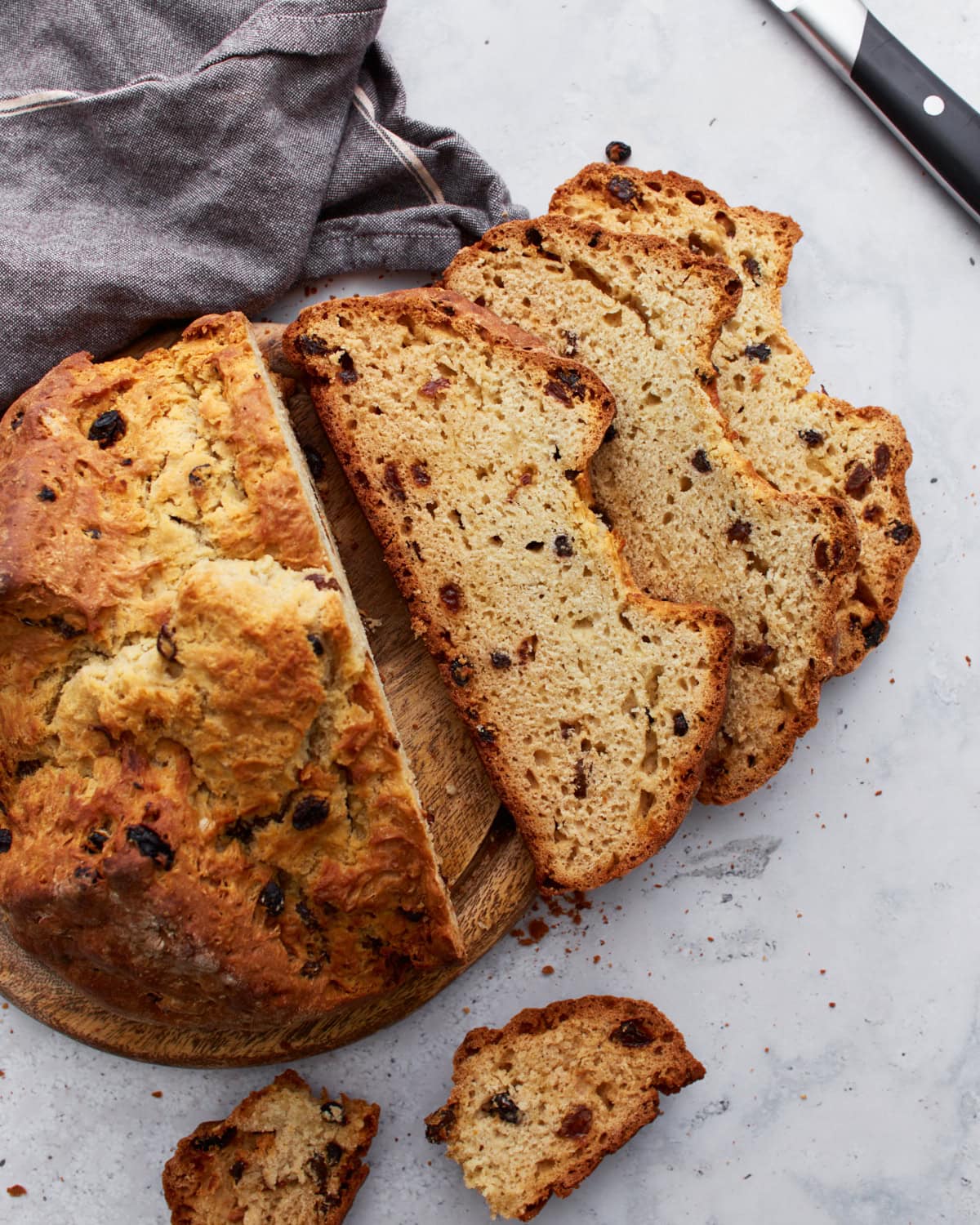
Gluten-Free Irish Soda Bread Recipe
The bread has a beautifully golden-brown crust and a dense yet tight crumb. The texture of the soda bread is similar to my Gluten-Free Biscuits or Gluten-Free Scones. My kids even said it tastes like a giant biscuit—high praise coming from them!
The dough is incredibly simple to prepare, making this a great recipe for bakers of any skill level. Plus, it’s versatile: there’s a dairy-free and vegan option included, ensuring that everyone at your table can enjoy it. Whether paired with a hearty soup, slathered with jam, or enjoyed on its own, this bread is a winner.
Gluten-Free Baking Tips
- Do not over-mix the dough. It should be a “shaggy” dough. Over-mixing can make for tough bread.
- If the dough is sticking to your hands, lightly wet your hands with water to keep the dough from sticking to your hands.
- Chop your butter and place it in the refrigerator until you need it to ensure it stays cold.
- I bake my soda bread in a cast-iron skillet because it makes for the best crispy crust. You can also use a baking sheet or baking pan.
- To ensure the crust is crispy, do not open the oven door during baking.
Gluten-Free Irish Soda Bread
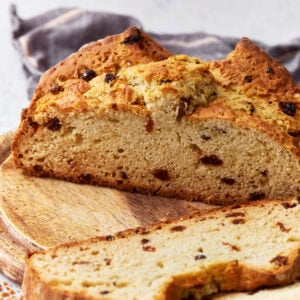
Ingredients
- 4 cups gluten-free all-purpose flour with xanthan gum, I like Pillsbury gluten-free flour. Not all gluten-free flours are created equal. You may experience different baking results depending on the gluten-free flour blend you choose.
- 1/2 cup granulated sugar
- 1 tablespoon baking powder
- 1 teaspoon baking soda
- 1 teaspoon salt
- 4 tablespoons unsalted butter, cold and chopped, For dairy-free use Smart Balance butter.
- 1 cup raisins, currants, or dried cranberries, You can also leave it out.
- 1 3/4 cups milk, For dairy-free use unsweetened almond milk.
- 1 1/2 tablespoons white vinegar, You can substitute lemon juice for white vinegar.
- 1 large egg, For egg-free use Bob's Red Mill gluten-free egg replacer.
Instructions
- Preheat the oven to 425°F.
- In a large measuring cup, add the white vinegar to the milk and stir to combine. Let stand for 5 minutes in the refrigerator to stay cold. (homemade buttermilk).
- In a large bowl, mix together the gluten-free flour, sugar, baking powder, baking soda, and salt.
- Add the cold butter and cut it into the gluten-free flour mixture with a pastry cutter, a fork, or your fingers until it resembles small peas.
- Stir in the raisins. If you are not a fan of dried fruit, you can leave it out.
- Whisk the egg and homemade buttermilk (milk and vinegar mixture) together.
- Make a well in the center of the dry ingredients and pour the egg and buttermilk mixture into the flour mixture.
- Using a large spoon, mix the gluten-free flour mixture and milk mixture together to form a shaggy dough. The dough will be soft but not too sticky. Do not over-mix the dough, or you will end up with tough bread.
- Sprinkle 1 tablespoon of gluten-free flour onto parchment paper. Turn the dough onto the parchment paper and gently bring the dough together into a round, about 8-inches by 8-inches. If the dough is sticking to your hands, lightly wet your hands with water.
- Gently fold the dough over on itself 2 times. You do this by folding the dough in half on top of itself and then doing it a second time. Form the dough back into an 8-inch by 8-inch round.
- Place the round dough onto a greased baking cast iron skillet, baking sheet, or baking pan.
- Using a knife, score the bread with a deep cross on top. Do not skip this step because it helps the middle of the bread bake though.
- Bake for 15 minutes at 425°F, then turn down the oven to 400°F and bake for 30 minutes more. When done, the loaf will be golden brown and sound slightly hollow when tapped on the bottom.
- Allow the loaf to cool for a few minutes then, and then place it on a wire rack to cool.
Notes
- For a browner crust, brush the dough with an egg or a milk wash before baking.
- I like to brush the top of the bread with melted butter after it is done baking.
Nutrition
Nutrition information is automatically calculated, so should only be used as an approximation.
How to Make Gluten-Free Irish Soda Bread Step-by-Step

Gather your ingredients.

Make buttermilk: Preheat the oven to 425°F. In a large measuring cup, make the buttermilk by mixing 1 ½ tbsp white vinegar and 1 ¾ cups milk (or dairy-free alternative). Put the mixture in the refrigerator to stand for 5 minutes.

Mix dry ingredients: In a large mixing bowl, mix 4 cups gluten-free flour, ½ cup granulated sugar, 1 tbsp baking powder, 1 tsp baking soda, and 1 tsp salt.

Add butter: Cut 4 tbsp of cold chopped butter into the flour mixture using a bench scraper, pastry cutter, or your hands. Keep mixing until the dough resembles small peas. Fold in the raisins, or omit if you don’t like dried fruit.
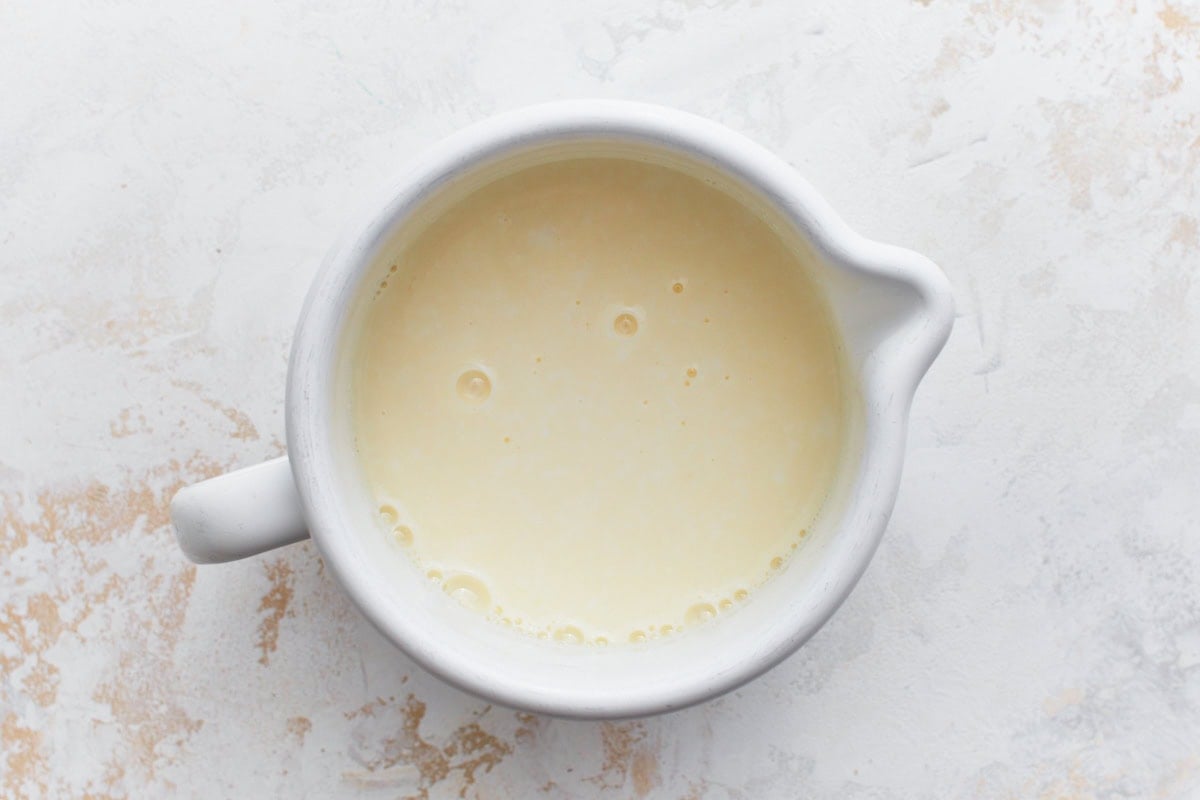
Grab the buttermilk from the fridge and whisk 1 egg into it.
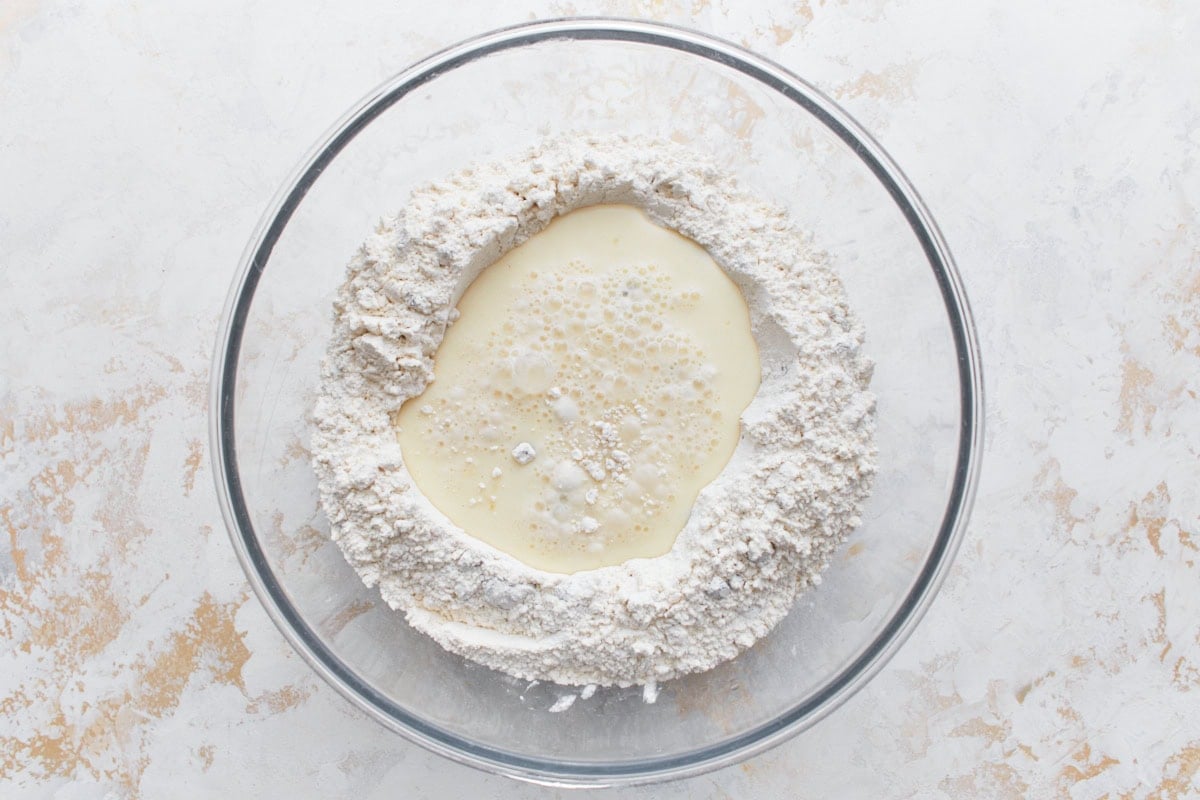
Make a well in the middle of the dry ingredients and add the egg and buttermilk mixture to the center.
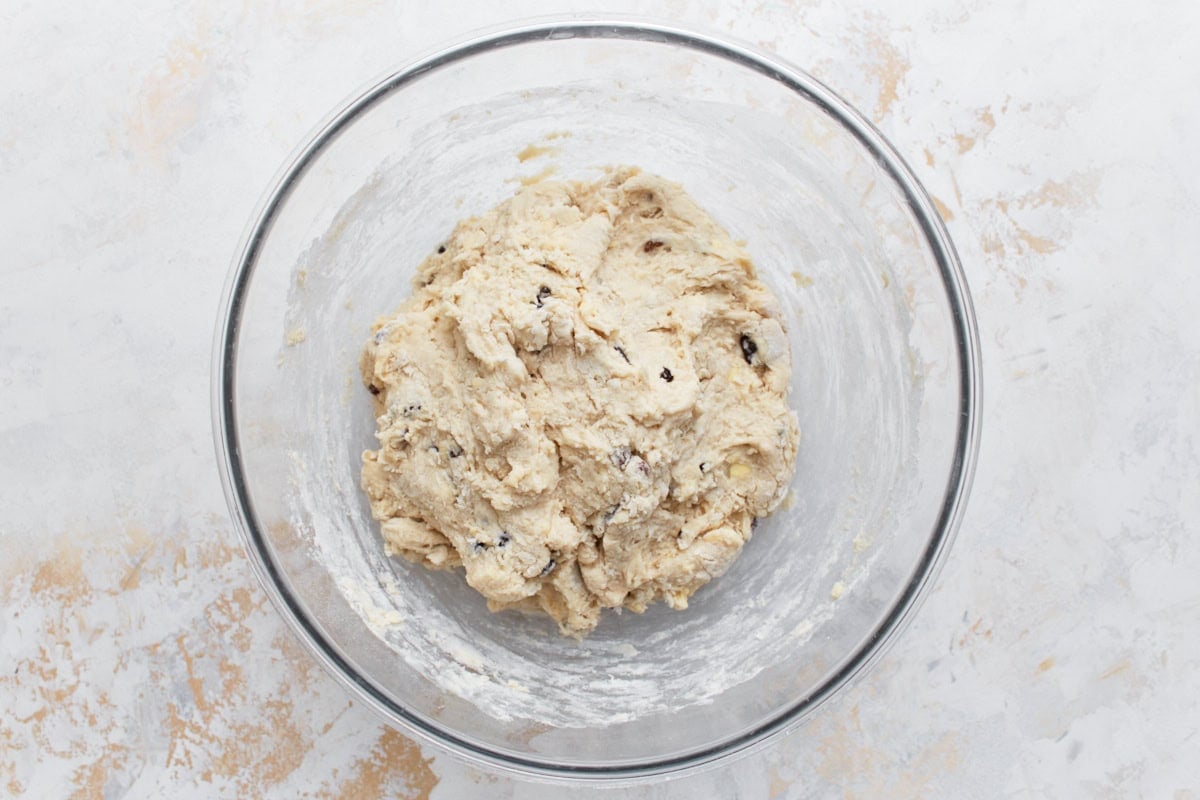
Form dough: Mix the gluten-free flour mixture and milk mixture using a large spoon until a shaggy dough forms. The dough should be soft and slightly sticky. Avoid over-mixing to prevent tough bread.
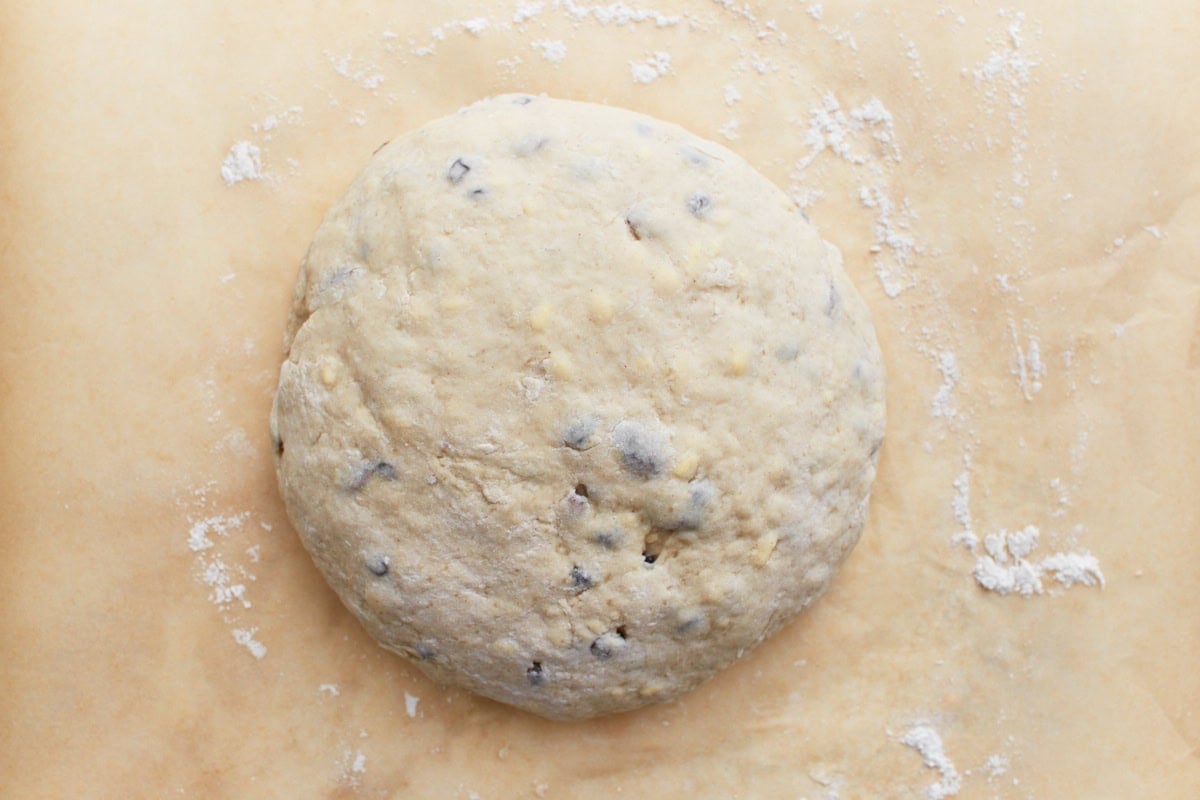
Dust parchment paper with 1 tablespoon of gluten-free flour. Place the dough on the parchment paper and gently shape it into an 8-inch round. If the dough sticks to your hands, wet them lightly with water for easier handling.

Fold the dough gently over itself twice by folding it in half and then repeating the process.

Reshape the dough into an 8-inch round after folding.

Transfer the round dough to a greased cast iron skillet, baking sheet, or baking pan.

Score bread: Score the top of the bread with a deep cross using a knife. This step is essential to allow the center of the bread to be baked evenly.
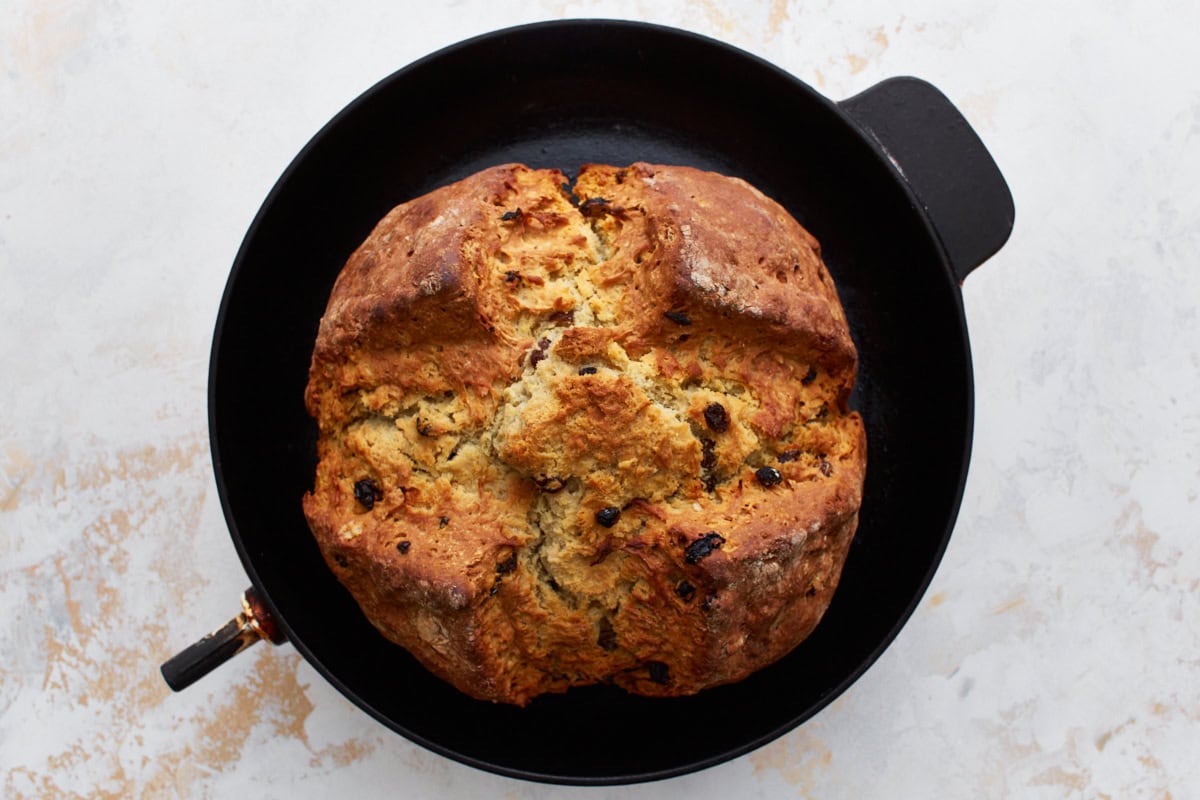
Bake: Bake the bread at 425°F for 15 minutes. Reduce the oven temperature to 400°F and bake for an additional 30 minutes. The loaf is ready when it turns golden brown and sounds slightly hollow when tapped on the bottom.

Let the loaf cool for a few minutes before slicing or serving. Enjoy!

Serving Suggestions
I enjoy a piece of gluten-free Irish soda bread with a healthy scoop of dairy-free butter and fruit jam.
Storage Instructions
Tightly wrap leftovers in plastic wrap or aluminum foil and place into an airtight container on the counter for 2-3 days.
You can also freeze the quick bread for 3-4 months in a freezer-safe bag. Defrost on the counter overnight.
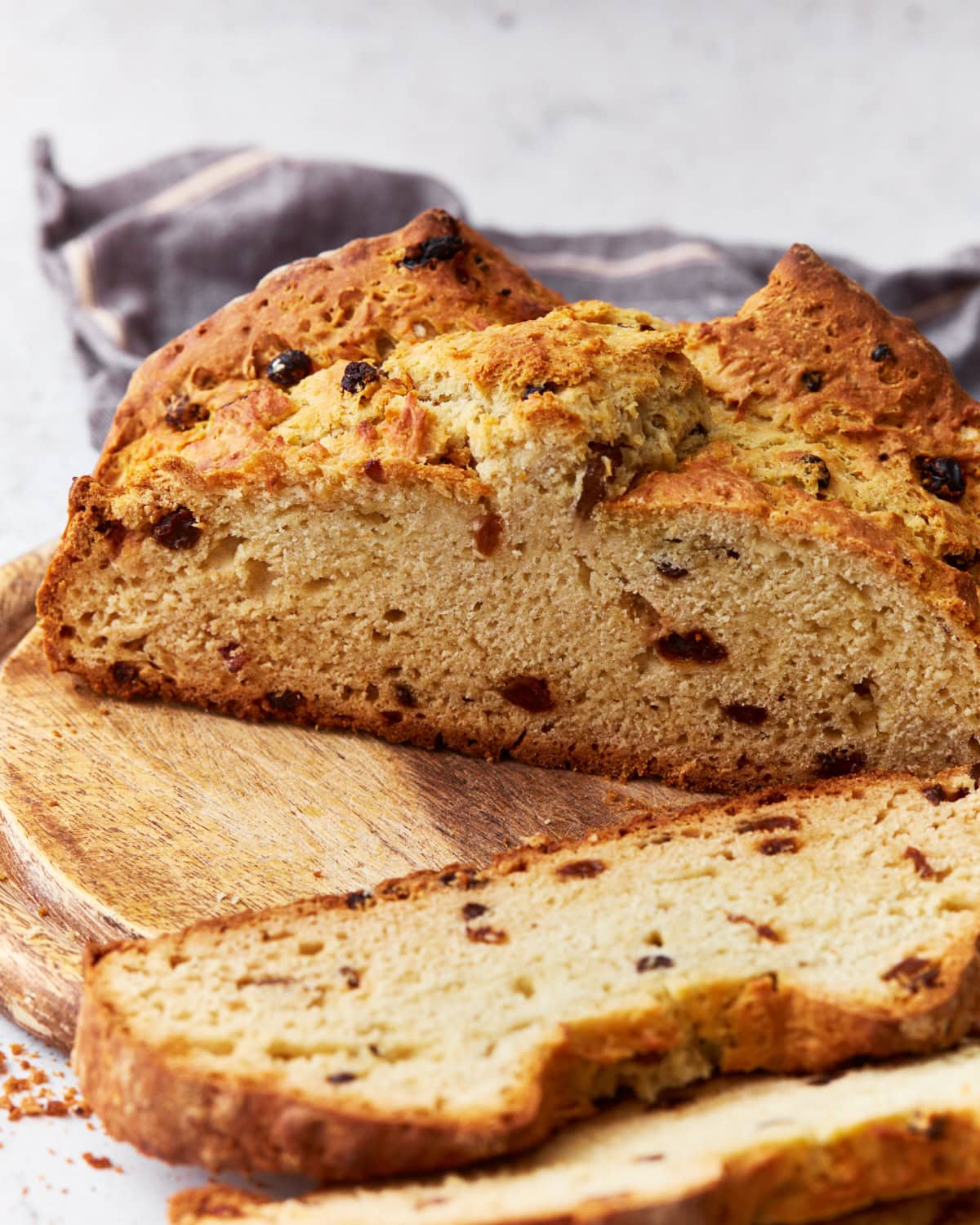


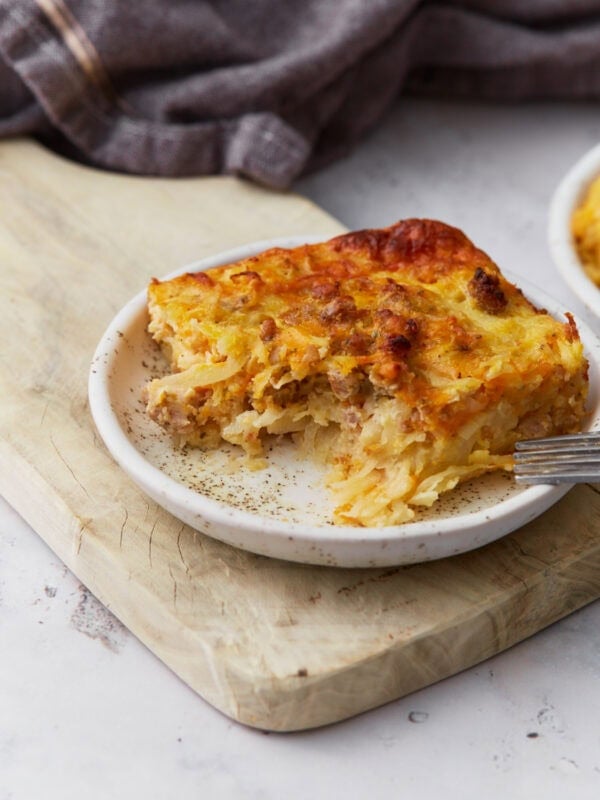
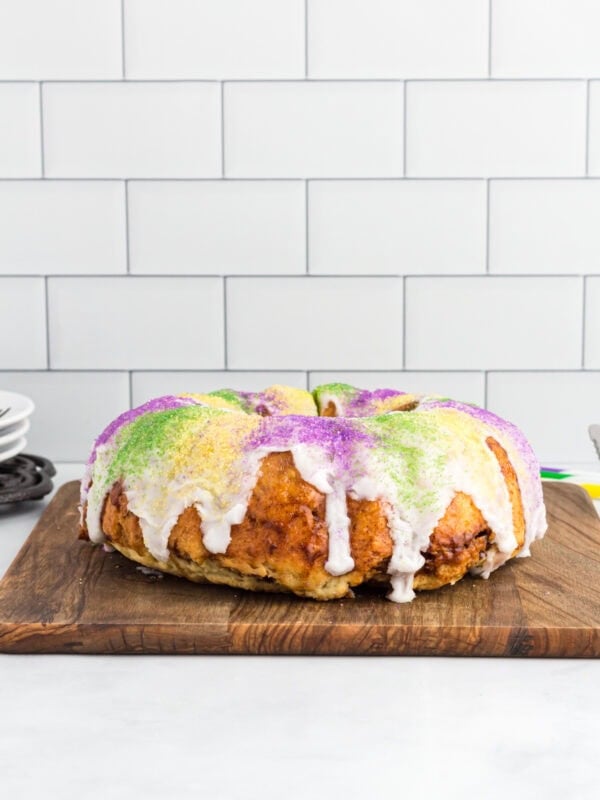
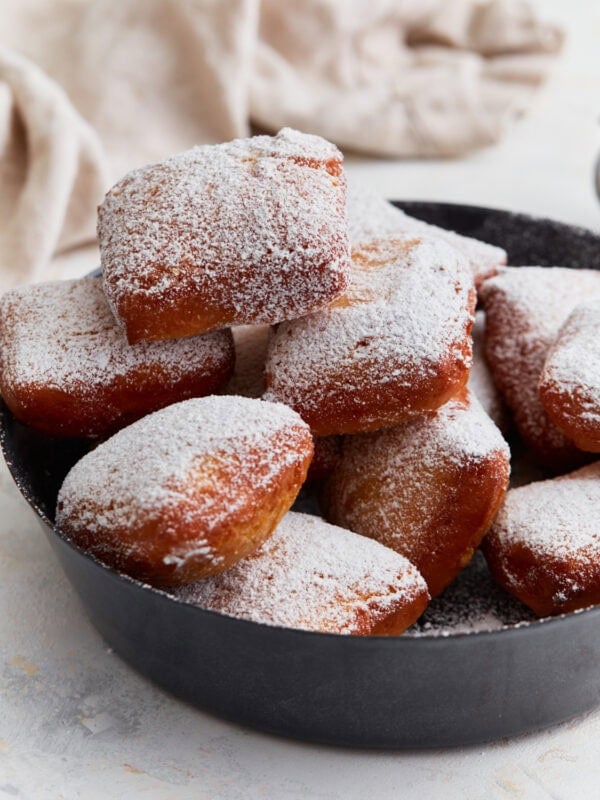
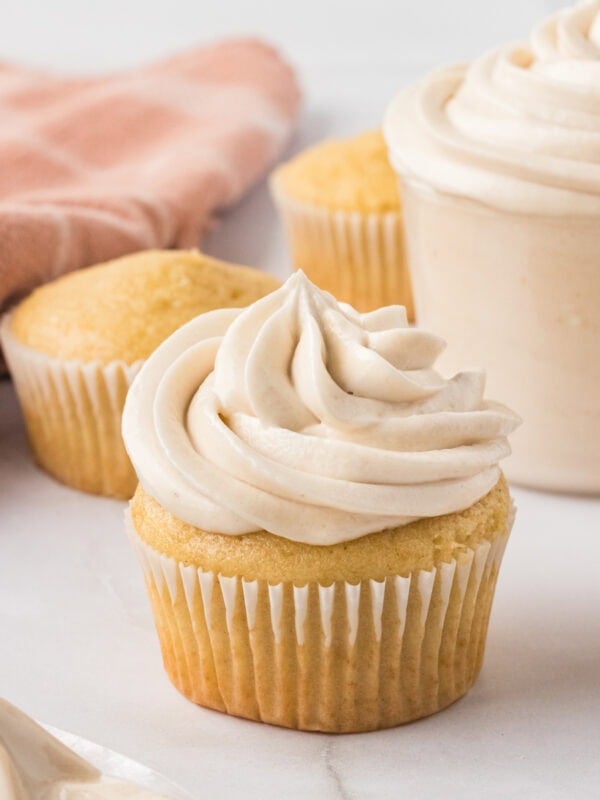






Made this tonight and it was delicious! Added 1 tablespoon caraway seeds for a more traditional flavor. Turned out perfectly crispy and light.
Could I make this into 3 mini loaves?
Yes, thats definitely possible. Follow the directions for preparing the dough, then divide it into 3 equal parts. Use 3 mini loaf pans like 6″x3″. Keep the oven at the same temp (375 degrees) but cut the cooking time to 30-35 minutes. Check the internal temp (should be around 200-205). Let the loaves cool for 5-10 minutes in the pans before removing and cooling on a rack. Enjoy!
The metric conversions are unfortunately incorrect. There was far less flour in the metric recipe than needed so it was a scramble to add flour to what was a ”batter” rather than a dough. Baked it regardless and the flavor was good. Will try again with different amounts.
Hi, 500 g is 4 cups. Which measurement was off?
This was SO yummy! I followed most of the recipe, making it gluten free & vegan. No one would ever know the difference. I used your recommended Pillbury GF flour, plain unsweetend soy milk, 3 tablespoons “Just Egg” (plant based liquid egg subsitute) much easier than the recommended powder. Baked in a cast iron skillet a bit longer as my GF stuff comes out gummy. It was perfect, came out crunchy all over, which we love, soft and just sweet enough on the inside with lots of raisins and not gummy at all. This is a keeper recipe! It’s a Happy St. Patrick’s Day here! Thank you!
Happy St. Patty’s Day!
Top o’ the morning to ye! Thank you for your fabulous recipes!!! Can I use a bread tin instead of making a round loaf? I promise to score the top!
Hi Christine, yes you can!
I used Bob’s Red Mill, real buttermilk and a bread tin. With a little help from the recipe above: BOOM! Nailed it! 🙂
Thank you!!
Awesome!!
Thank you for a yummy recipe. Love the taste and texture of this Irish Soda Bread. My mixture was more like a thick batter than a dough, even after I added a bit more GF flour. I finally just spooned the “batter” into an iron skillet, and baked it, and it came out perfect.
I might reduce the amount of milk next time I make it.
Really good GF recipe–better than the traditional Soda Bread we used to buy at the shop. Thanks for the super-detailed recipe. We used King Arthur GF Bread Flour and it worked well.
I made this recipe with King Arthur 1to1 and oat milk and the dough was quite wet, however it was very crumbly after it was done baking. The taste is amazing! Any ideas on how to make it so it doesn’t fall apart?
Hi Melanie, Perhaps it needed to be baked a little longer.
Hi, if using regular buttermilk, do we still need the milk and vinegar? assuming no but wanted to ask. Thank you!
Hi Joann, Correct, if using regular buttermilk, you won’t need the milk and vinegar!
Has anyone tried this with bobs 1-1?
I love this recipe. Since I am allergic to yeast, I am always lookin for quick breads. This is definitely a keeper!!!
My first attempt EVER with Irish soda bread; I made it this evening with the modifications below and it came out perfect!
– King Arthur 1:1 GF flour
– Oat Milk (original)
– Dried cranberries
It came out as promised and tastes amazing. I highy recommend this recipe.
Will the recipe work of I reduce the amount of sugar?
Could I replace the sugar with honey?
thanks
Hi Anne! You can certainly reduce the amount of sugar, but it may affect the final product. The bread also may not brown as much on the exterior. A mixture of sugar and honey could work well, but I can’t offer specific suggestions without testing it myself.
Loved this! Did not put raisins in mine and still was outstanding. Husband kept saying really outstanding.
This recipe was a great success (see one suggested modification below). I have tried other GF bread recipies and they were very disappointing. This one was delicious and received thumbs up from two people who do not need gluten free. I made it in a 8″ cast iron pan greased with canola oil and it came right out.
I suggest reducing the milk from 1-3/4 cups to 1-1/2 cups (I haven’t tried this yet). The dough was too wet. I dusted it with a little more GF flour so that I could handle the dough once I turned it out. Using wet hands (according the recipe) would not have been good. SInce the dough was on the wet side I had to bake it just a littl longer (tooth pick and thump test). The bread was good through the next day. I recommend a a quick foil-wrapped re-warm in the oven. I can’t wait to make this recipe again.
Can I use Buckwheat flour, because where i live there is hard to get other GF flour or it is double the price.
Hi Laura! I have not baked with buckwheat flour, so I do not know if it will work well with any of my recipes. My readers in the UK use Doves gluten-free flour successfully with my recipes.
I made this recipe with Namaste gf flour and dried cranberries. It was delicious and not as dry as most Irish soda breads. It is definitely a keeper.
I made this bread as per instructions using almond milk (unsweetened but had vanilla in it) and King Arthur GF Measure for Measure 1:1 flour. It came out perfect and better than the non GF breads I have made! Irish Soda Bread is the one thing I missed since being GF on St. Patrick’s Day. Finally I can join in the festivities and not feel out of the loop. The only thing now is that I have to fend off all the non Gluten Free people who are devouring it at a rapid pace! Thank YOU!!!
Happy Saint Patricks Day! This recipe is amazing! My family loved it, Thank You!
Just made this Irish Soda Bread for St Pat’s Day tomorrow. Of course, had to taste it today. My husband & I loved it. My first attempt at any bread. Wonderful. Lots of steps but easy to follow. Just the best!
My GF All purpose baking flour does not have xantham gum; how much should I add for this recipe?
Hi Lyn! You could add 1 teaspoon of xanthan gum to the 4 cups of gluten-free flour. A 1/4 teaspoon of xanthan gum for every 1 cup of gluten-free flour in a recipe is a good guide. That ratio might increase slightly if you are working with something that needs more elasticity like yeast recipes. Thanks for asking. I hope you enjoy it!
Can I make this gf bread with lactose free milk?
Yes Marion you can make the bread with lactose-free milk. I hope you enjoy it!
Can you use regular buttermilk?
Yes Barbara you can use regular buttermilk in the recipe. Just leave out the white vinegar. I hope you enjoy it!
What size cast iron skillet?
Hi Rene! I recommend using a 9-inch or large castiron skillet. The bread loaf should be an 8-inch round. Thank you so much for asking. I hope you enjoy it!
This recipe is the best, I’ve made it a few times and it comes out great, thx again,